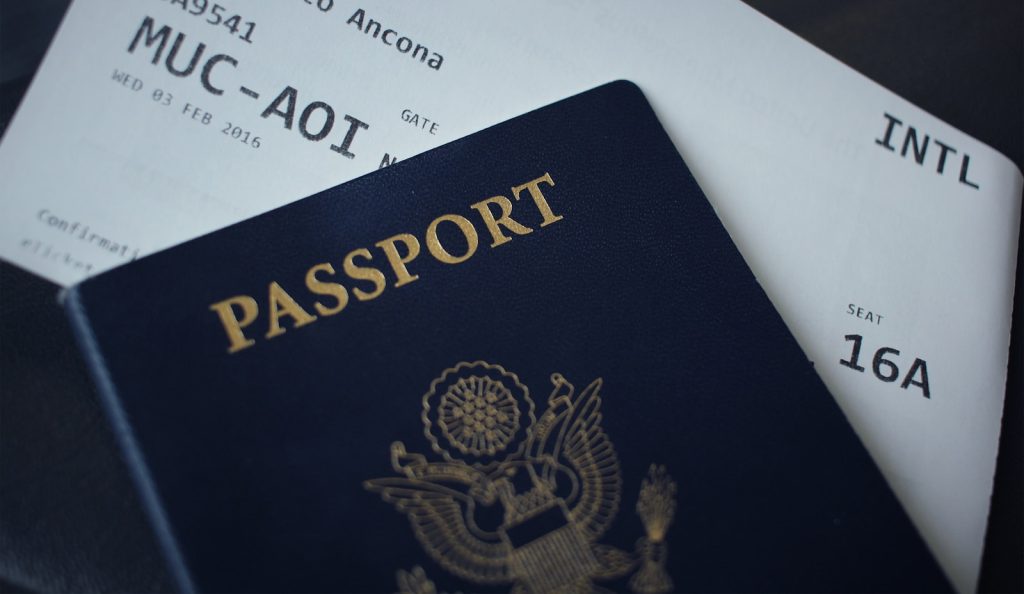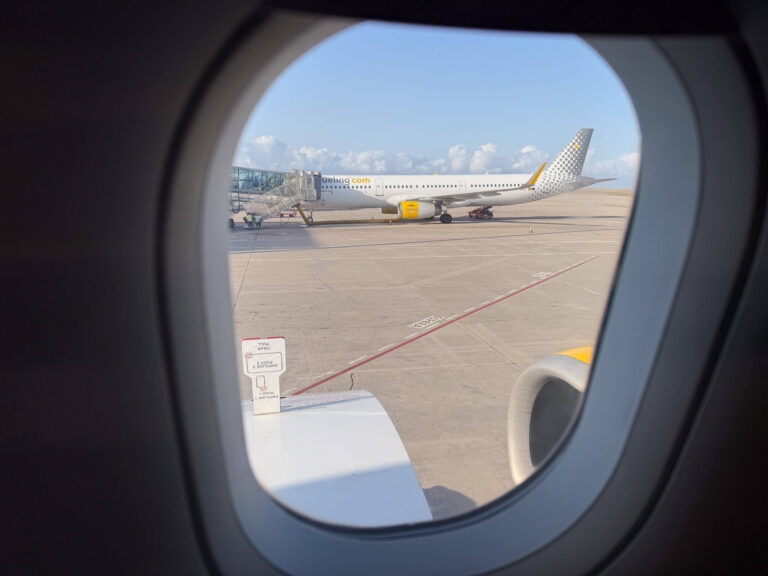First Time Traveling Internationally: A Beginners Ultimate Guide!
The first time traveling internationally can be intimidating, especially if you are doing it on your own. It can seem like there are one million things you need to know before and during a trip. If you are interested in traveling internationally, but aren’t sure where to start or what to expect during your trip, this article is for you!
Again, before you read on, this article is written SOLEY for BEGINNER travelers wishing to plan and execute their first trip abroad! These topics are based on a poll taken, asking people who haven’t traveled, why they haven’t and what questions they would have if they were to travel abroad 🙂

Work on Monday Travels is supported by readers and, at no cost to you, may earn commission when you book or purchase using our links. Full disclosure found here.
Pre-Trip Preparations
Your first time traveling internationally begins here. A LOT of the work required to travel abroad is in the pre-trip preparations: the planning, the booking, the packing, etc. You need to book flights, accommodations, etc. When is the best time to do that? How do you make a good itinerary without having been to the place you are going? Do you need foreign currency and where do you get it?
How far ahead to book flights, accommodations, etc
Flights: If you know where you want to go, start looking at flights about 6 months out and keep track!
- Use the Hopper app or Google Flights and they’ll help to track trends and when it will be best to book. TYPICALLY, flights get higher once you get within 1-2 months from the trip, especially for summer travel.
- About 3-4 months out is a good timeframe to aim for.
- Every now and then you’ll luck out with a flight mishap, like when we found $350 international flights two weeks out, but DON’T bank on this! You’ll more than likely pay more.
Accommodations: Don’t wait last minute., especially if you are traveling to a popular place at a popular time. Things will fill up and you’ll pay more.
- To get the best prices, I’d recommend booking 2-3 months out. You’ll likely be okay even 4-6 weeks out if its not a popular time or destination. The more popular the location and time, the further out you need to book in order to not spend a fortune.
- I know a lot of people are limited to summer travel due to school schedules, etc. If you are planning a summer trip, BOOK EARLY. I’d recommend booking summer travel AT least the winter before
- However, if you are traveling during off-season it is quite possible to book accommodations last minute. It’s just riskier that you’ll pay higher prices.
Booking Flights: Start here when you plan
Flying internationally typically isn’t cheap. Flights are going to be a large portion of a travel budget, so begin here so you don’t end up planning a trip to a place that ends up having super expensive flights.
Booking flights can be intimidating. Trying to find the best deal, the right departure time, the best connecting flight, etc. Start looking at flights sooner rather than later.
- I typically start by searching Google flights. They have a great search “from” your home airport “to anywhere” feature where you can see which destinations have good flight prices!
- You can check “bargain flight sites” such as Skyscanner and Skiplagged that have intermittent flight deals, but my luck with these sites hasn’t been as good recently.
- No matter what airline, double check the price with booking directly with the airline; if the price is the same, I recommend booking directly because they are more likely to help you if something happens to your flight.
Bottom line, LOOK. Compare prices and see how cheap you can get them. Also, do this in an “incognito” window on your computer to minimize cookies and price inflation from over-searching for flights.
Click here on more tips to find cheap flights.
Planning an Itinerary: Where to Start?
Once flights are booked, the trip is on! Now you need to figure out what you want to do in your destination. Making the itinerary is the tedious part of planning any trip, especially an international trip in which you may not be as familiar with the layout of the land or the best way to get around.
Here is how to plan a great itinerary on your own, broken down into 5 easy steps:
- Research- Go to Pinterest, Google, Instagram, wherever and make a random list of things you might like to see and do.
- Organize- Take your list and organize it based upon location (what city its in or what part of a city its in, etc). This helps you decide how much time you should allot for each location in your destination.
- Map out the itinerary- This helps you decide where to start/end a trip and/or how to map out your days the most efficiently.
- Make a table- It really helps to visualize what your days will look like by making a table with each day, activity for the day, and usually I place booking confirmation numbers in the table for accommodations for each night.
- Book your accommodations- Once the itinerary is set, you can decide where you would like to stay in each location.
This is a broken down version of how we typically plan out our itineraries. For more details and for an example of how we planned our 8-day Costa Rica itinerary, click here!
Booking accommodations: Where to book them?
Look everywhere and anywhere. I usually check prices of AirBnBs, VRBOs and hotels. I’m impartial to one or the other and usually go with the most affordable option.
- One thing I rarely stray away from on choosing accommodations, though, is the location. Being in walking distance of restaurants and main attractions is so convenient and such a time-saver, so I do a lot of research on the “most walkable” areas of each destination and choose the most affordable accommodations in those areas.
- I typically check Booking.com for hotel options because I get discounts from booking through them so often, but there are loads of third-party hotel sites. Hotels.com, Expedia, Trivago, etc. I recommend choosing one and sticking to it in order to get “loyalty perks.”
- I’ve also used Priceline and their Pricebreaker deal; you choose which “star” of hotel you want with three options and then they choose which hotel you get. We saved quite a bit of money on our road trip as a couple when we couldn’t split costs with friends.
Don’t forget to check prices directly on the website. Hotels typically prefer you to book directly with them, so sometimes prices are cheaper or you can get rewards/perks by booking directly!
Click here for more information on booking accommodations
Currency: Do you Need It and Where do You Get it?
It’s not a bad idea to get local currency before you travel. If you want to save money with the exchange rate, do it at your local bank or credit union to get a better exchange rate. However, in reality, I haven’t done this since 2009, so if you want to wait to get local currency in your destination:
- Find a currency exchange center OUTSIDE of the airport to save on the conversion rate; airports and ATMs abroad typically have higher exchange rates.
I advise not to get TOO much cash out. My go-to way to pay for things when abroad is my travel card.
- Have cash for tips or small purchases and research your destination to know if you will need cash for taxis (for example, Aruba is cash only only taxis and the hotels in Greece that provided transportation to/from the airport required cash).
- Book everything you can on a travel credit card. Here is why:
- There are no foreign transaction fees (check your credit card!), I have access to all of my purchases to see how much I’ve spent, PLUS I get travel points that I can put toward the trip or the next trip.
- I’ve paid for multiple flights to Europe with credit card points in the past. I ENCOURAGE YOU TO GET ONE TO SAVE ON TRAVELING.
What to Expect During Travel Days
Travel days can be the most stressful part of traveling. But the more prepared you are, the less stressful it is! And, once you get a few trips under your belt you will feel more comfortable with the whole process!
- I’m breaking this down A LOT, because some people in the poll mentioned a reluctancy to travel (or fly) due to the process of having to navigate security, airports, etc.
What do you need to have and do Before you get to the airport?
Before you head to the airport make sure you have/do these things:
- Check if you need a visa to enter the destination you are going to.
- If you need a visa and you forgot to apply for one, you can often do a Visa on Arrival at the airport.
- Right now, US citizens don’t need a Visa to enter Europe, but I think that time is coming soon!
- Check-in to your flight on the app if you can
- You will be able to do this 24 hours before your flight (or 48 hours for some longer flights)
- Checking-in online means you will get a digital boarding pass on your phone- no need to visit the airline counter, and if you are traveling with a carry-on only, this means you can head straight to security when you get to the airport
- Grab your passport- Everything is replaceable BUT THIS
Navigating the airports
Airports can be intimidating, but just know that there will be LOADS of people willing to answer any questions you have throughout the whole process and signs will be everywhere!
When you Get to the Airport
- The first thing you do when you get to the airport depends on if you have checked luggage and/or if you have already checked in to your flight:
- If you’ve checked in on the app and have no checked luggage, go straight to security
- If you can’t check into the flight on the app OR if you are checking luggage, you will go straight for the desk of your chosen airline and get a paper ticket for your flight and/or get your luggage weighed and checked
- Security
- Security is easy and isn’t something to stress over. The biggest dilemma is the time that it can take to get through security at times.
- Securities vary vastly across the globe. But, universally, all liquids need to be 3oz or less.
- Some securities require you to place your 3oz bottles of liquid in a ziplock bag (Heathrow in London is strict about this), but more often than not, you don’t have to.
- Sometimes large electronics need to be taken out of carry-ons- laptops, tablets, E-readers, etc
- Once you get through security, its time to head to your gate
- Some airports are easy to navigate, others are not. FOLLOW THE SIGNS.
- Some airports require you to get on a tram to get to another terminal (Dallas, Atlanta, other big, international airports). You can also download a map of most airports prior to going if it will ease your anxiety of navigating an airport.
- Your gate number will be located on your electronic or paper boarding pass. It will also be on the boards of incoming/outgoing flights
- Once you get to your gate you’re good! Feel free to get your food or coffee prior to arriving at your gate.
- Some airports are easy to navigate, others are not. FOLLOW THE SIGNS.
Once you Land
Once you land in your foreign destination, you will have to clear immigration and customs before you can venture out.
- Once you land you will have to go through immigration first. This is where your passports/visas/etc will be checked. Often, this is when you get your stamp, though it seems stamps may becoming a thing of the past ☹️
- Next, if you have luggage, you’ll get your luggage and then head to customs
- If you land in your final destination, from there, you’ll either follow signs to car rentals (which may require a bus trip) or to your local transportation options (taxi pickup, bus, metro, etc)
- If you are landing in one foreign country, but proceeding to another, you will have to recheck your bags, go back through security and head to your gate for your final flight!
- Note: There can be some variation of when you go through immigration and customs. For example, in Ireland and Aruba, you go through US customs in those countries before boarding the plane to go home. I’ve also received stamps prior to leaving the foreign destination to go home.
How to Navigate and Prepare for Travel once you Reach Your Destination
Honestly, once you reach your destination it will feel like the hard part is over! Once you take your first public transportation, underground train ride, or drive your rental car in a foreign destination for the first time you will quickly start to feel like a pro.
Getting around: transportation
How do you want to get around your international destination? It ultimately depends on where you want to go.
- In Austria we traveled off the beaten path and visited several small towns. Bus routes were few and far between. 100% recommend renting a car in that situation.
- In Spain we traveled only to Madrid, Toledo, and Segovia, all of which were connected by train and had poor parking within the cities. Definitely recommend using public transportation here!
If you are renting a car, book it prior to your trip. The sooner, the cheaper usually. It is also cheaper to book train tickets ahead of time if you are visiting a popular destination at a popular time (ie. a Greek or Italian summer). However, metro tickets will be purchased when you land.
Click here to read more about choosing your transportation options for Europe.
Language barriers
I’m always so surprised by how many people speak English so well. It always makes me feel so inferior and makes me want to be fluent in another language (except which do I choose?!).
- However, you WILL stumble upon some places where there are several people who do not speak English. Spain is one of those places and it definitely occurs more as you get outside of Europe.
- Also know that many restaurants in these areas do not have an English menu (which is fine, its their country and English isn’t their language!). However, its good to be prepared.
- I recommend using Google Translate camera feature to read menus you aren’t able to read!
I do recommend learning a few basic terms before traveling. It helps SO MUCH when ordering food if you can ask for the basics or the bathrooms and locals really appreciate the effort!
Knowing the Customs in New Places: Be Respectful
If you are going to be a traveler, be a respectful one. Before you visit a new destination, do a quick Google of “traditional customs in ___” to see what you should be prepared for.
- For example, in some countries, the left hand is considered unclean and handshaking needs to be done with the right hand. When visiting many temples and cathedrals around the world, you need to ensure you have your shoulders and knees covered.
How to Even Afford to Get Started
All of this information is pretty useless if you can’t afford to travel internationally, right? I can’t tell you how to make more money, but I can say international travel can reaallllllyyyyyy be doable! I hope I can convince you of that.
First Things First: It has to be a Priority
You will never be able to afford to travel if you don’t make it a priority. Once you really decide you WANT to take a trip, it is easier to find ways to find save money that can be put toward traveling.
Budgeting for your First Time Traveling Internationally
Set a budget of what you can realistically afford to put toward traveling. Find a range of what you are willing to spend and find a vacation to fit that budget.
- This doesn’t have to be what you have in possession at this exact time. Calculate how much you can put back each month and then how
Save. Minimize how much you spend on stupid stuff like shopping and eating out and put that money toward a travel budget. If you can’t save a lot per month, plan your trip well in advance so you have more months to save up.
Pick the Right Destination and Type of Trip
You can find an international destination in a variety of budgets, but you have to be strategic and smart about it. If affordability is an issue, don’t choose to go to Scandinavia. It’s expensive. Don’t choose luxury hotels. Don’t go on an African Safari.
The biggest way to afford international travel is to follow cheap flights; pick your destination based upon flight affordability!
- In general, you can typically find affordable flights to Central America; maybe you start there.
- Or, know affordable destinations. Maybe you go to Morocco, that is generally affordable, so you spend a little more of flights, but save money in your destination.
Also, when you are working on your itinerary, know that the more you move destinations the more expensive your trip will be. Staying in one spot and exploring from there is typically cheaper.
Travel Reward Points
In all honesty, the only way I have been able to afford traveling as much as I have is by using travel credit card points. I haven’t paid full price for flight tickets very many times in the last 7 years. I put EVERYTHING I can on my travel cards (groceries, gas, bills, large expenses, etc) and rack up as many points as possible.
Travel Credit Cards
I am not a super travel card hacker (opening a new card every 3-4 months to get the big bonuses) like some people. I just have two travel credit cards that I prefer and use them regularly.
- The one I use the most is the Capital One Venture card because I find the way to redeem points super easy to use.
- My other card is the Chase Sapphire, which has better travel insurance (lost luggage coverage, etc) and has double points when booking in their portal. I just don’t prefer using the portal all of the time, especially when booking for multiple people. But it really does have great rewards.
Read more on the travel credit cards I use for fly miles and why!
Other Travel Reward Programs
I don’t take advantage of other travel reward programs as much as I do the credit cards. However, there are several hotel rewards programs that can result in free rooms and discounts.
- Specific hotel chains will have reward programs, so if there are particular ones you like, join their rewards programs. Wyndham, Hyatt, IHG, Best Western, etc are some of the more popular chains that offer rewards. The more you book with them, the more perks.
- Booking sites also have rewards. The one I use most often is Booking.com Genius Loyalty program, which gives you 10-20% off bookings, depending on your status level, as well as room upgrades occasionally.
- OneKey Rewards is a newer loyalty program where you can earn OneKeyCash for every purchase made on Expedia, Hotels.com or VRBO
First TIme Traveling Internationally Recap
I know, this is a LOT of information in one spot 😅 But, I REALLY want to convince people that their first time traveling internationally is NOT that far out of reach! I get so excited when I hear that someone is planning to go abroad for the first time because I know how exciting and eye-opening it can be!
SO, if this article can convince even ONE person that going abroad is an achievable goal then I feel as if my job here is done! I legitimately want to see people go (anywhere actually, doesn’t have to be abroad) and I am here to answer ANY questions you have while you plan your first (or second) international trip! Just don’t be intimidated; traveling abroad is similar to traveling domestically, the flight is just longer to get there 😂
Good luck planning! For help deciding where to go and all blog posts and resources, go to workonmondaytravels.com!





